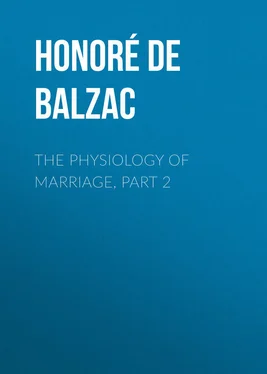Honoré Balzac - The Physiology of Marriage, Part 2
Здесь есть возможность читать онлайн «Honoré Balzac - The Physiology of Marriage, Part 2» — ознакомительный отрывок электронной книги совершенно бесплатно, а после прочтения отрывка купить полную версию. В некоторых случаях можно слушать аудио, скачать через торрент в формате fb2 и присутствует краткое содержание. Жанр: literature_19, foreign_antique, foreign_prose, на английском языке. Описание произведения, (предисловие) а так же отзывы посетителей доступны на портале библиотеки ЛибКат.
- Название:The Physiology of Marriage, Part 2
- Автор:
- Жанр:
- Год:неизвестен
- ISBN:нет данных
- Рейтинг книги:4 / 5. Голосов: 1
-
Избранное:Добавить в избранное
- Отзывы:
-
Ваша оценка:
- 80
- 1
- 2
- 3
- 4
- 5
The Physiology of Marriage, Part 2: краткое содержание, описание и аннотация
Предлагаем к чтению аннотацию, описание, краткое содержание или предисловие (зависит от того, что написал сам автор книги «The Physiology of Marriage, Part 2»). Если вы не нашли необходимую информацию о книге — напишите в комментариях, мы постараемся отыскать её.
The Physiology of Marriage, Part 2 — читать онлайн ознакомительный отрывок
Ниже представлен текст книги, разбитый по страницам. Система сохранения места последней прочитанной страницы, позволяет с удобством читать онлайн бесплатно книгу «The Physiology of Marriage, Part 2», без необходимости каждый раз заново искать на чём Вы остановились. Поставьте закладку, и сможете в любой момент перейти на страницу, на которой закончили чтение.
Интервал:
Закладка:
If by this system of inaction, in combination with our system of diet, you fail to obtain satisfactory results, throw yourself with might and main into another system, which we will explain to you.
Man has a certain degree of energy given to him. Such and such a man or woman stands to another as ten is to thirty, as one to five; and there is a certain degree of energy which no one of us ever exceeds. The quantity of energy, or willpower, which each of us possesses diffuses itself like sound; it is sometimes weak, sometimes strong; it modifies itself according to the octaves to which it mounts. This force is unique, and although it may be dissipated in desire, in passion, in toils of intellect or in bodily exertion, it turns towards the object to which man directs it. A boxer expends it in blows of the fist, the baker in kneading his bread, the poet in the enthusiasm which consumes and demands an enormous quantity of it; it passes to the feet of the dancer; in fact, every one diffuses it at will, and may I see the Minotaur tranquilly seated this very evening upon my bed, if you do not know as well as I do how he expends it. Almost all men spend in necessary toils, or in the anguish of direful passions, this fine sum of energy and of will, with which nature has endowed them; but our honest women are all the prey to the caprices and the struggles of this power which knows not what to do with itself. If, in the case of your wife, this energy has not been subdued by the prescribed dietary regimen, subject her to some form of activity which will constantly increase in violence. Find some means by which her sum of force which inconveniences you may be carried off, by some occupation which shall entirely absorb her strength. Without setting your wife to work the crank of a machine, there are a thousand ways of tiring her out under the load of constant work.
In leaving it to you to find means for carrying out our design – and these means vary with circumstances – we would point out that dancing is one of the very best abysses in which love may bury itself. This point having been very well treated by a contemporary, we will give him here an opportunity of speaking his mind:
"The poor victim who is the admiration of an enchanted audience pays dear for her success. What result can possibly follow on exertions so ill-proportioned to the resources of the delicate sex? The muscles of the body, disproportionately wearied, are forced to their full power of exertion. The nervous forces, intended to feed the fire of passions, and the labor of the brain, are diverted from their course. The failure of desire, the wish for rest, the exclusive craving for substantial food, all point to a nature impoverished, more anxious to recruit than to enjoy. Moreover, a denizen of the side scenes said to me one day, 'Whoever has lived with dancers has lived with sheep; for in their exhaustion they can think of nothing but strong food.' Believe me, then, the love which a ballet girl inspires is very delusive; in her we find, under an appearance of an artificial springtime, a soil which is cold as well as greedy, and senses which are utterly dulled. The Calabrian doctors prescribed the dance as a remedy for the hysteric affections which are common among the women of their country; and the Arabs use a somewhat similar recipe for the highbred mares, whose too lively temperament hinders their fecundity. 'Dull as a dancer' is a familiar proverb at the theatre. In fact, the best brains of Europe are convinced that dancing brings with it a result eminently cooling.
"In support of this it may be necessary to add other observations. The life of shepherds gives birth to irregular loves. The morals of weavers were horribly decried in Greece. The Italians have given birth to a proverb concerning the lubricity of lame women. The Spanish, in whose veins are found many mixtures of African incontinence, have expressed their sentiments in a maxim which is familiar with them: Muger y gallina pierna quebrantada [it is good that a woman and a hen have one broken leg]. The profound sagacity of the Orientals in the art of pleasure is altogether expressed by this ordinance of the caliph Hakim, founder of the Druses, who forbade, under pain of death, the making in his kingdom of any shoes for women. It seems that over the whole globe the tempests of the heart wait only to break out after the limbs are at rest!"
What an admirable manoeuvre it would be to make a wife dance, and to feed her on vegetables!
Do not believe that these observations, which are as true as they are wittily stated, contradict in any way the system which we have previously prescribed; by the latter, as by the former, we succeed in producing in a woman that needed listlessness, which is the pledge of repose and tranquility. By the latter you leave a door open, that the enemy may flee; by the former, you slay him.
Now at this point it seems to us that we hear timorous people and those of narrow views rising up against our idea of hygiene in the name of morality and sentiment.
"Is not woman endowed with a soul? Has she not feelings as we have? What right has any one, without regard to her pain, her ideas, or her requirements, to hammer her out, as a cheap metal, out of which a workman fashions a candlestick or an extinguisher? Is it because the poor creatures are already so feeble and miserable that a brute claims the power to torture them, merely at the dictate of his own fancies, which may be more or less just? And, if by this weakening or heating system of yours, which draws out, softens, hardens the fibres, you cause frightful and cruel sickness, if you bring to the tomb a woman who is dear to you; if, if, – "
This is our answer:
Have you never noticed into how many different shapes harlequin and columbine change their little white hats? They turn and twist them so well that they become, one after another, a spinning-top, a boat, a wine-glass, a half-moon, a cap, a basket, a fish, a whip, a dagger, a baby, and a man's head.
This is an exact image of the despotism with which you ought to shape and reshape your wife.
The wife is a piece of property, acquired by contract; she is part of your furniture, for possession is nine-tenths of the law; in fact, the woman is not, to speak correctly, anything but an adjunct to the man; therefore abridge, cut, file this article as you choose; she is in every sense yours. Take no notice at all of her murmurs, of her cries, of her sufferings; nature has ordained her for your use, that she may bear everything – children, griefs, blows and pains from man.
Don't accuse yourself of harshness. In the codes of all the nations which are called civilized, man has written the laws which govern the destiny of women in these cruel terms: Vae victis! Woe to the conquered!
Finally, think upon this last observation, the most weighty, perhaps, of all that we have made up to this time: if you, her husband, do not break under the scourge of your will this weak and charming reed, there will be a celibate, capricious and despotic, ready to bring her under a yoke more cruel still; and she will have to endure two tyrannies instead of one. Under all considerations, therefore, humanity demands that you should follow the system of our hygiene.
MEDITATION XIII
Perhaps the preceding Meditations will prove more likely to develop general principles of conduct, than to repel force by force. They furnish, however, the pharmacopoeia of medicine and not the practice of medicine. Now consider the personal means which nature has put into your hands for self-defence; for Providence has forgotten no one; if to the sepia (that fish of the Adriatic) has been given the black dye by which he produces a cloud in which he disappears from his enemy, you should believe that a husband has not been left without a weapon; and now the time has come for you to draw yours.
Читать дальшеИнтервал:
Закладка:
Похожие книги на «The Physiology of Marriage, Part 2»
Представляем Вашему вниманию похожие книги на «The Physiology of Marriage, Part 2» списком для выбора. Мы отобрали схожую по названию и смыслу литературу в надежде предоставить читателям больше вариантов отыскать новые, интересные, ещё непрочитанные произведения.
Обсуждение, отзывы о книге «The Physiology of Marriage, Part 2» и просто собственные мнения читателей. Оставьте ваши комментарии, напишите, что Вы думаете о произведении, его смысле или главных героях. Укажите что конкретно понравилось, а что нет, и почему Вы так считаете.












